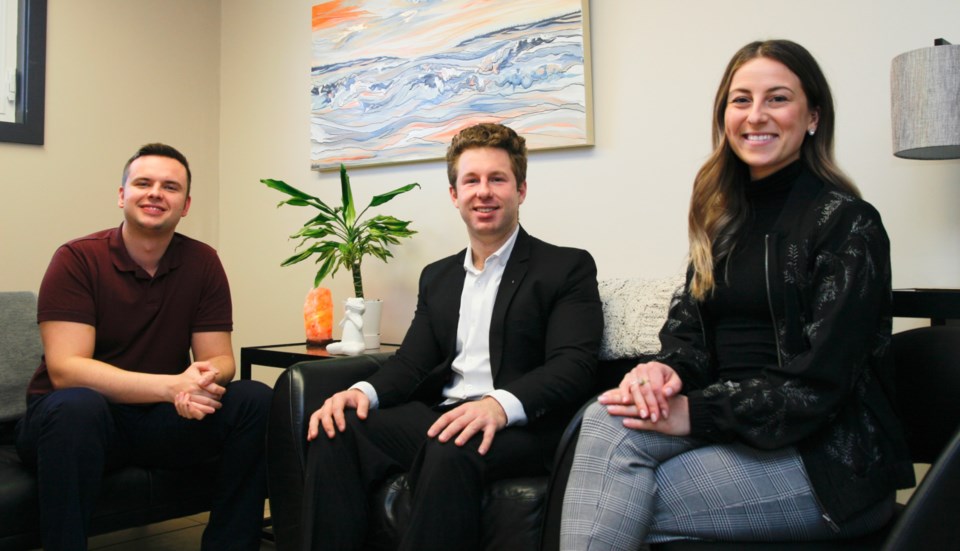A Thunder Bay-based organization that uses the dissociative anesthetic ketamine in order to treat mental health conditions and chronic pain will be opening a clinic in Sault Ste. Marie in early December.
The Canadian Centre for Psychedelic Healing (CCFPH) will open its ketamine-assisted psychotherapy (KAP) clinic on the third floor of Elgin Tower Dec. 5, with plans to offer its service to clients five days per week.
“We’re excited to help the people that need it,” said CCPH owner and founder Dr. Mario Nucci. “There’s a large unaddressed group of patients that are struggling, and this can really bring them profound relief — and I should say not even just for mental health patients, but also for chronic pain.”
Ketamine is primarily used as a painkiller in veterinary surgery and as a tranquilizer for animals, but the drug nicknamed special K or vitamin K in some recreational drug circles has also been known to users over the years for its dissociative, mind-altering effects. Nucci says it was about two decades ago when researchers began exploring the use of ketamine in humans.
A licensed family physician since 2016, Nucci initially began following data on ketamine in earnest as a resident at medical school.
When Nucci eventually launched his own independent practice in Thunder Bay, Ont. with a focus on mental health, he says his colleagues in psychiatry and psychology “would send me people they couldn’t fix.”
Nucci would hire additional staff amid a demand for ketamine-assisted psychotherapy in the region, eventually launching CCFPH in Thunder Bay in 2019. He says his organization follows a research and evidence-based model to provide psychedelic-assisted psychotherapy to a “treatment-resistant” population living with mental illnesses such as anxiety, depression and post-traumatic stress disorder.
According to clinical research compiled by CCFPH, up to 70 per cent of patients can expect to see an improvement in depression and post-traumatic stress disorder symptoms with repeated ketamine injections.
“I’m an evidence-based physician. I’ve never tried any substances that alter your state of mind, but I just stand behind the evidence that’s there and the patient experiences that we’ve had,” he said. “The evidence and safety profile is to the point where we can’t hold this back from the people that need it.”
Typically, ketamine-assisted psychotherapy appointments are about two hours in duration and consist of 30 minutes of talk therapy and preparation before a patient is administered an intramuscular ketamine injection.
The injection goes to work in about five minutes, and lasts anywhere from 45-60 minutes. A 30-minute session referred to as “integration” takes place afterwards.
According to CCFPH, research on the use of ketamine suggests that two treatments per week over the course of a three-week period yields the best results.
Nucci says ketamine reduces the default mode network in the brain, which spits out fixed patterns of thinking and behaving, placing patients in a more “more mindful, more open state.”
“This medicine suspends that part of the brain, and when you’re under that state, it really allows you to have therapeutic experience where you can process things more deeply and more meaningfully — and so that’s where when you add the psychotherapy to the medicine, you have that incremental benefit,” he said. “You can process trauma, you can process grief, you can see shifts in insights and shifts in behaviour that much more rapidly.”
It’s a topic that Dr. Yuliya Knyahnytska, a clinician scientist with The Centre for Addiction and Mental Health — billed as Canada’s largest teaching hospital for mental health and addiction — has been researching as an expert in treatment-resistant disorders and the principal investigator for ketamine research trials at the hospital.
Knyahnytska says the current interest in ketamine can be chalked up to desperation in the “enormous” amount of people suffering from depression.
“The proliferation of something like ketamine or psychedelics or any other novel treatment is exciting,” said Knyahnytska. “It’s exciting from the scientific point of view because we really don’t have a lot of options after people fail their first and second and third line of treatment.”
The interest in ketamine as a potential treatment for depression emerged in the 2000s and there were a couple of trials which demonstrated a “very robust, very fast response” to ketamine, Knyahnytska says.
But she adds that there are so many variations in research trials that it’s "almost impossible to systemize the data in a meaningful way."
“As an intervention, it has very good potential, and there have been a lot of studies — good, well-organized randomized controlled trials to demonstrate that ketamine, as an intervention, is effective,” she said. “What is lacking though, is the systemization of data and outcomes, because it’s so scattered and heterogenic.”
Knyahnytska adds that clinical trials involving ketamine go through very rigid supervision and supervision from Health Canada and hospitals. But she says that’s not the case in community-based clinics.
“That can unfortunately result in very dangerous outcomes for the patient,” she said.
Nucci, who remains a firm believer in ketamine-assisted therapy offered by CCFPH, is hopeful the demand for its services in the Sault grows over time.
“The way that this transforms people’s lives by bringing them back, I’ve never seen anything like this in medicine where you can have this transformative impact,” said Nucci. “It’s one of the most rewarding things as a physician to help people like this.”
Consultations can be arranged by calling (807) 345-4400 or via email at [email protected].
